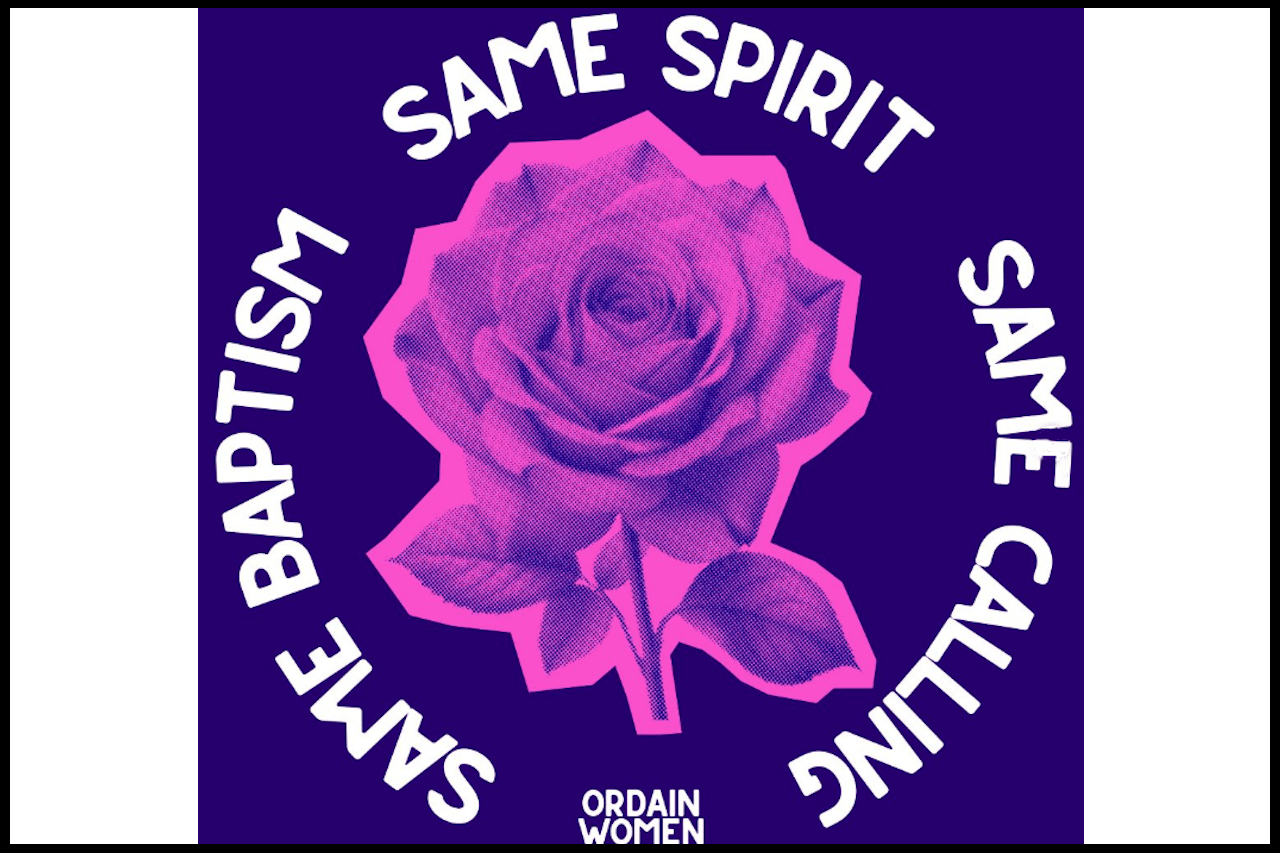Isaiah 53: 10-11 (RM) or 53: 4-12 (RCL); Psalm 33; Hebrews 4: 14-16 (RM) or 5: 1-10 (RCL); Mark 10: 35-45.
“Same Baptism. Same Spirit. Same Calling.”
The motto circles the periphery of a round badge, actually two badges, one with a white background and one in navy, with a radiant rose in the middle. Two colours to match all your outfits. And that’s not all. We were invited to take a handful of stickers with the same design that we could put up in places where they might be seen – you know, lamp posts, street signs, buildings. Around Rome.
When we started out to attend a street event organized by one of the church reform groups, I picked up the badge… then wondered if it might mark me for detention or even arrest by the police, even though we had a legal permit. I slipped it into my pocket. My passport was in my belly bag. Just in case I had to produce ID.
The lengths to which earthly powers will go to maintain control can be quite amazing. On the streets of Rome, any piece of fabric or paper containing text could mark a person for unwelcome police intervention. And why was it that two days before, one of the Italian train companies could go on strike and threaten to snarl the network, or workers anywhere in Italy could stage a sciopero, one of Italy’s many revolving labour strikes – but a bunch of, mostly, ladies and gentlemen of a certain age, walking, chatting and chanting, was a threat? If power is an absolute, what were they afraid of? Why did they feel threatened?
And that leads us straight into our Gospel reading for today, two dialogues with Jesus that point an accusing finger straight at those who seek high office for themselves.
James and John had clearly come up from the ranks of hard-working, foul-smelling fishermen when Jesus called them to follow him. We surmise they saw the crowds following Jesus, saw him show he had power to heal the sick, heard him proclaim that the reign of heaven is here, and put it all together.
In Mark’s account these guys don’t even inquire politely. They prance right up and demand that Jesus give them whatever they want. Then they demand to be named vice-presidents of the company.
Jesus told James and John, “You do not know what you are asking. Can you drink the cup that I drink, or be baptized with the baptism with which I am baptized?” They confidently reply, “We can.” But of course, where are they when Jesus is arrested and tortured before he is crucified? Nowhere to be found. Some Baptism. Some Spirit.
Jesus identifies, not with the Roman imperial dominators, nor with the local puppet governors, nor with the militarized messiah figure who was believed would conquer them and overthrow their power, then replace them with more of the same: but rather with those whose power is not “over,” but “for and with.”
Not what the disciples expected. Not a paradigm shift, more like a tectonic shift.
And yeah, it can be risky. Maybe that’s a concept of the cross that will resonate with our contemporaries more than atonement theology or internalized guilt. Knowing you’re risking something, but in the strength of the spirit, and joined with companions driven by the same spirit, you take a deep breath and do it anyway.
Those who defend the dignity and equality of all human persons, and the dignity in the church of all the baptized, probably won’t be tortured and killed. It’s illegal in most countries. But they’ll have to confront more subtle, manipulative forms of ridicule and suppression. They might be told that their role is merely complementary to those who claim power. They might hear that justice for the great majority is merely a “niche issue.” Or be told that the time is simply, um, “inopportune.” Go away, in other words. Go make the coffee.
There was one more text on the badges and stickers. Way down at the bottom, below the stem of the radiant rose, in microscopic print that people of my age squint to read, were two words. “Ordain women.”
© Susan K. Roll
Photo Credit: Women’s Ordination Conference
Susan Roll retired from the Faculty of Theology at Saint Paul University, Ottawa, in 2018, where she served as Director of the Sophia Research Centre. Her research and publications are centred in the fields of liturgy, sacraments, and feminist theology. She holds a Ph.D. from the Catholic University of Leuven (Louvain), Belgium, and has been involved with international academic societies in liturgy and theology, as well as university chaplaincy, Indigenous ministry and church reform projects.





Brilliant blog entry, Susan! Your articulation is spot on and very much appreciated. As a person of age I totally identify with your observations. Your writing very accurately describes the ways in which power is exercised. Thank you for sharing.
A thought that has continued with me is your insight that Jesus solidarity is ‘with those whose power is not “over,” but “for and with.”’ A big power shift that makes relationship possible.